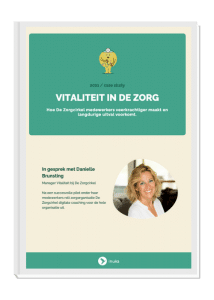The work pressure amongst health care workers in The Netherlands is on average a lot higher than amongst employees in general, causing health care workers to deal with stress and burn-out. According to the CBS, in 2015, more than half of the health care workers indicated to have to work very hard. Unsurprisingly, COVID-19 has only added more stress on health care employees. In particular the emotional burden, the lack of recovery time and people not obeying the measures have been challenging for the employees.
The health and well-being sector consists of 1.2 million employees. Of these, 480 thousand are active in health care, including hospitals, mental health care and general practices. The rest of the employees (680 thousand) are employed in the care and well-being sector, including nursing and care homes, home care and childcare. The majority of the health care workers are women, namely 83% percent.

Causes of work stress in the health care sector
1. Emotionally hard work
One of the reasons why working in the health and wellbeing sector can be demanding, is because of the emotional involvement. The emotional burden is the highest of all industries; more than a quarter of employees in the health and wellbeing sector say that their work is emotionally challenging, which is more than twice the average.
2. Little autonomy
A high workload can lead to mental and physical distress and on the long run, to absenteeism. However, this does not have to be the case. A factor that plays a big role in the effects of the workload on the employee, is whether the employee can organize their work autonomously. In the health and wellbeing sector, there is relatively little autonomy in the work; 46% of the employees in this sector indicate that they are able to organize their work independently, compared to 57% of employees in total.
3. Short of staff
Cuts in the health care have put more pressure on health care professionals. Ten thousands of employees in the health care sector have lost their job, causing the remaining employees to make up for that gap by working harder. This leads to stress and in the long-term, even burn-out.
What can you do as manager to reduce stress amongst health care professionals?
1. Show support to your employees
An engaged team of supervisors and colleagues is crucial for the employees to feel supported in coping with high demands of the jobs in the health care sector. As someone whose job it is to take care of other people, it is extra important to learn how to take care of yourself. Therefore, having a team that emphasizes this notion can be very helpful for the employees in this sector.
Ways in which you can support your employees:
- Regularly check-in on them and ask how they are doing. Ask how you can support them and truly listen to them, so that you know what they need.
- Provide room for autonomy in their work where it is possible.
- Organize fun and social events that engage the employees and help to let go of the emotional burden.

2. Peer support
A feeling of connectedness amongst employees can make them feel empowered to deal with stress at work and other challenges that arise. Research has shown that peer support improves quality of life, increases and improves engagement with services, and increases whole health and self-management.
“I have learned how important it is to maintain the feeling of “together we are strong!”. That feeling arose automatically at the beginning of the crisis. People were anxious and insecure, which increased connectedness and motivation. We see that a lot of strength, initiative and new ideas come from this feeling of connectedness, which is very valuable.” — Daniëlle Brunsting, Manager Vitality at Zorgcirkel
Some ideas to enhance peer support:
- Create a support group. This group consist of employees in the health care sector that are trained to support their colleagues.
- Weekly check-in moments to see how everyone is doing and whether someone needs support/help with their mental health.
- Creating fun experiences with each other by e.g., celebrating each other’s birthdays, showing gratitude, bringing in food and share that with each other.
3. Provide mental health tools
Besides support from colleagues and team leader, it is important that employees have the tools to take care of their mental health. Mental health tools come in various forms. Some way in which these tools can be provided is by:
- Organizing events that raise awareness about (mental) health tools (e.g., mindfulness, exercise, practicing gratitude) and how they can be used to help reduce stress amongst employees.
- Collaborating with an external mental health support provider that supports employees.
Read here how Inuka uses Problem Solving Coaching to support employees.
How the Zorgcirkel made their employees more resilient
After a successful pilot amongst employees of Zorgcirkel, specialists in elderly care, we have started a conversation with Daniëlle Brunsting, Manager Vitality at Zorgcirkel. We have asked her what the biggest challenges were in the organisation, how Inuka has helped with these, and which lessons she learned from this trajectory. Read here the full report on how Zorgcirkel prevented burnouts when 1/3 of the employees was at risk of fall out.
Download case study (Dutch only):




